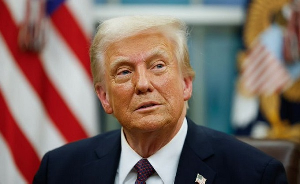General News of Friday, 15 February 2008
Source: communications directorate – www.cppuk.org
Corruption Is a Top Issue for Ghanaians – CPP
Ghana has entered the eighth year of NPP rule and President J.A. Kufuor has delivered his eighth and final “State of the Nation” address.
The President highlighted areas the NPP consider to be achievements. There is an issue which many Ghanaians put at the top of their list of priorities however and feel that the President did not focus sufficiently on it in this address or in the many years of NPP government – that issue is corruption.
The President announced that the Attorney General's Department had set up an Anti-Corruption Unit to study the recommendations of the Public Accounts Committee, but many who have witnessed the arrogant corruption of the NPP years feel this is not enough and remain to be convinced about NPP commitment on tackling corruption.
Ghanaians know first hand the effects of corruption and know that all the efforts and strides that the country seeks to make on the development front in education, health, jobs etc is undermined and devalued by corruption.
The Chairman of Transparency International (TI) Peter Eigen. Put it this way "Corruption is a major cause of poverty as well as a barrier to overcoming it," Many feel that the government needs to understand the nature of corruption and its effect on society and thus it is worth reminding government about the different forms of corruption and how it affects ordinary Ghanaians and Ghana’s development.
Corruption is when government officials use their governmental powers for illegitimate private gain. Misuse of government power for other purposes, like repression of political opponents or failure to solve killings of political opponents such as the murder of the Northern Regional Chairman of the CPP – Alhaji Mobila.
Forms of corruption include bribery, embezzlement, extortion, graft, cronyism, nepotism, patronage. Corruption may facilitate criminal activity such as drug trafficking and money laundering, and trafficking.
The end result of political corruption is a kleptocracy, which means “rule by thieves".
Bribery around the world is estimated at about $1 trillion (£494bn) and the burden of corruption falls disproportionately on the bottom billion people living in extreme poverty.
Corruption poses a serious development challenge. In the political realm, it undermines democracy and good governance, in the judiciary compromises the rule of law; and corruption in public administration results in the unfair provision of services, in elections and in legislative bodies it reduces accountability and distorts representation in policymaking; More generally, corruption erodes the institutional capacity of government as resources are siphoned off, and public offices are bought and sold. At the same time, corruption undermines the legitimacy of government and such democratic values as trust and tolerance. Corruption undermines economic development by generating considerable distortions and inefficiency. In the private sector, corruption increases the cost of business through the price of illicit payments, the management cost of negotiating with officials, and the risk of breached agreements or detection. The availability of bribes induces officials to contrive new rules and delays. Where corruption inflates the cost of business, it also distorts the playing field, shielding firms with connections from competition and thereby sustaining inefficient firms.
Corruption leads to environmental degradation and destruction, because officials can be bribed. The same affects social rights such as worker protection, prevention of child labor and unionization.
Corruption generates economic distortions in the public sector by diverting public investment into capital projects where bribes and kickbacks are more plentiful. Officials may increase the technical complexity of public sector projects to conceal or pave way for such dealings, thus further distorting investment. Corruption also lowers compliance with construction, environmental, or other regulations, reduces the quality of government services and infrastructure, and increases budgetary pressures on government.
Economists argue that corruption in Africa takes the form of rent extraction with the resulting financial capital moved overseas rather than invested at home and it is estimated that from 1970 to 1996, capital flight from 30 African countries totaled $187bn, exceeding those nations' external debts. The result is retarded and deprived development
International surveys point to corruption as having a significant and detrimental impact on the lives of the very poor in developing countries. Corruption not only reduces the income of the poor but also wrecks programmes related to their basic needs, from sanitation to education to healthcare. It results in the misallocation of resources to the detriment of poverty reduction programmes
The attainment of the Millennium Development Goals is put at risk unless corruption is tackled as an integral part of poverty reduction strategies. There is a growing global consensus on the importance of corruption as an impediment to development, reflected in the ratification of the UN Convention against Corruption (UNCAC).
After a near 8 year rule the NPP government must understand that it has failed to focus on corruption and tackle it with the seriousness needed.
It has failed in its” zero tolerance on corruption” agenda, but above all it should understand that all our efforts at development as a nation is devalued by corruption and thus in our view the State of the Nation address should start with progress on the anti-corruption drive. Without this all else is meaningless to the lives of ordinary Ghanaians.
Communications Directorate – www.cppuk.org info@cppuk.org cppyouth@gmail.com
Entertainment











